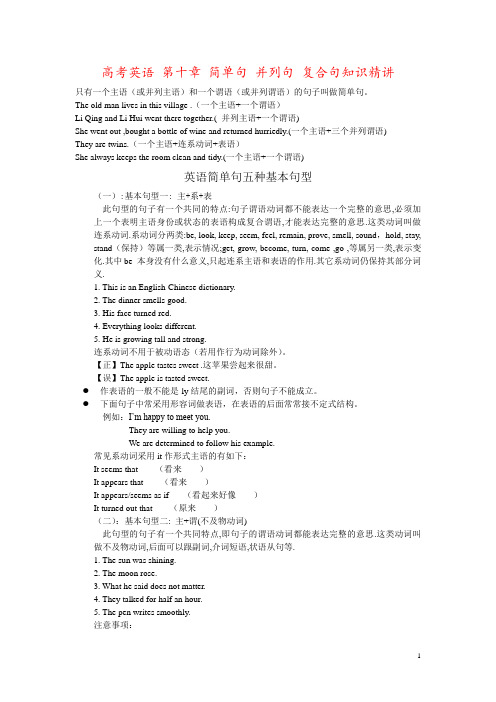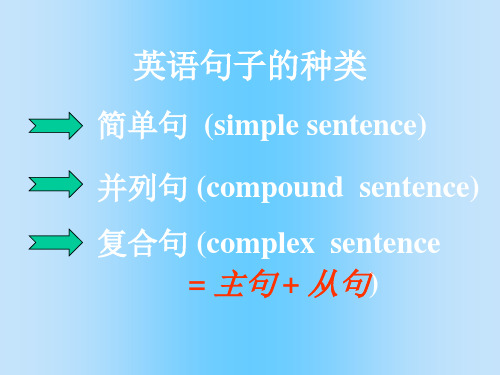英语语法精讲-句子成分及简单句并列句和复合句
(完整版)简单句-并列句-复合句

2021/7/26
25
2. 祈使句(Imperative Sentences)
用来提出请求,建议或发出命令,肯定的祈使句
用动词原形开头,否定的祈使句用Don’t 或 Never + 动词原形开头。例如:
1. Sit down, please! 2. Don’t be nervous!
有时为了加强语气还可以在动词前面用上助动词do。 例如:Do come earlier, please!
例如: Hurry up, and we’ll be there in time. = If we hurry up, we’ll be there in time.
2. 并列连词so 不能与because连用; 并列连词 but不能和although或 though连用。
2021/7/26
20
V. 句子的分类(按用途)
句子按用途可分为: 1. 陈述句 (Declarative Sentences) 2. 疑问句 (Interrogative Sentences) 3. 祈使句 (Imperative Sentences) 4. 感叹句 (Exclamatory Sentences)
2021/7/26
21
1. 陈述句(Declarative Sentences)
2021/7/26
12
6. 状语 ( Adverbial )
常指修饰动词、形容词或副词的成分,修饰动词时
表示动作发生的时间、地点、目的或方式等;修饰
形容词或副词时表示它们的程度等。状语常由副词、
介词短语、动词不定式或分词短语等充当。 例如:
1. The miners work very hard.
用来说明一个事实或陈述一种看法。例如: 1) Light travels faster than sound.
高考英语 第十章 简单句 并列句 复合句知识精讲

高考英语第十章简单句并列句复合句知识精讲只有一个主语(或并列主语)和一个谓语(或并列谓语)的句子叫做简单句。
The old man lives in this village .(一个主语+一个谓语)Li Qing and Li Hui went there together.( 并列主语+一个谓语)She went out ,bought a bottle of wine and returned hurriedly.(一个主语+三个并列谓语)They are twins.(一个主语+连系动词+表语)She always keeps the room clean and tidy.(一个主语+一个谓语)英语简单句五种基本句型(一):基本句型一: 主+系+表此句型的句子有一个共同的特点:句子谓语动词都不能表达一个完整的意思,必须加上一个表明主语身份或状态的表语构成复合谓语,才能表达完整的意思.这类动词叫做连系动词.系动词分两类:be, look, keep, seem, feel, remain, prove, smell, sound,hold, stay, stand(保持)等属一类,表示情况;get, grow, become, turn, come ,go ,等属另一类,表示变化.其中be 本身没有什么意义,只起连系主语和表语的作用.其它系动词仍保持其部分词义.1. This is an English-Chinese dictionary.2. The dinner smells good.3. His face turned red.4. Everything looks different.5. He is growing tall and strong.连系动词不用于被动语态(若用作行为动词除外)。
【正】The apple tastes sweet .这苹果尝起来很甜。
【误】The apple is tasted sweet.●作表语的一般不能是-ly结尾的副词,否则句子不能成立。
高考英语句子成分:简单句、并列句和复合句(精品资料)

(六)宾语补足语
英语中有些及物动词,除有一个直接宾语 英语中有些及物动词, 以外,还要有一个宾语补语, 以外,还要有一个宾语补语,才能使句子 的意义完整. 的意义完整.带有宾语补足语的一般句型 某些及物动词( 宾语+宾 为:某些及物动词(如make等+宾语 宾 等 宾语 ).宾补可由名词 形容词,副词, 宾补可由名词, 补).宾补可由名词,形容词,副词,不 定式,分词,介词短语和从句充当.例如: 定式,分词,介词短语和从句充当.例如:
高考英语语法
句子成分;简单句, 句子成分;简单句, 并列句和复合句
简单句的五种基本句型
1,主语+系动词 表语:e.g. He is a student. ,主语 系动词 表语: 系动词+表语 2,主语 不及物动词:e.g. We work. 不及物动词: ,主语+不及物动词 3,主语+及物动词 宾语:e.g. ,主语 及物动词+宾语: 及物动词 宾语 Henry bought a dictionary. 4,主语 及物动词 双宾语(间接宾语 直接 及物动词+双宾语 ,主语+及物动词 双宾语(间接宾语+直接 宾语): ):e.g. My father bought me a car. 宾语): 5,主语 及物动词 复合宾语(宾语 宾补): 及物动词+复合宾语 宾补): ,主语+及物动词 复合宾语(宾语+宾补 e.g. Tom made the baby laugh. 注:其他各种句子都可由这一种基本句型扩展, 其他各种句子都可由这一种基本句型扩展, 变化或省略而构成. 变化或省略而构成.
(四)表语
表语用以说明主语的身份,特征和状态, 表语用以说明主语的身份,特征和状态, 它一般位于系动词( 它一般位于系动词(如be, become, get, look, grow, turn, seem等)之后.表语一 等 之后. 般由名词,代词,形容词,分词,数词, 般由名词,代词,形容词,分词,数词, 不定式,动名词,介词短语, 不定式,动名词,介词短语,副词及表语 从句表示.例如: 从句表示.例如:
高考英语语法复习 ---简单句并列句复合句

(武汉调研4月) Put yourself in situations where you will be forced to communicate in English, ___ you will see more progress over time. A. or B. so C. yet D. and (崇文4月) You must get up early in the morning, ___ we’ll have to leave without you A.and B. but C. or D. so
英语句子的种类
简单句 (simple sentence) 并列句 (compound sentence)
复合句 (complex sentence = 主句 + 从句)
简单句的五种基本句型
• 主语 + 不及物动词 ( S + Vi ) • 主语 + 及物动词 +宾语 ( S + Vt + O) • 主语 + 系动词 + 表 (S + LV + predicative) • 主语+双宾动词+间宾+直宾(S +Vt +O.indir+O. dir) • 主语 + 宾补动词 +宾语 +宾语补语 • (S + Vt. + O + O. compl) •There + be / stand/ lie / live...
其它平行结构:not…but…, either…or…, neither…nor, not only…but also…, would rather…than…(宁愿……不愿 ……), rather than(而不), as well as(既……也……)等。
英语句子结构 简单句并列句和复合句

The flower smells sweet.
Seeing
is believing.
常见的6类系动词: 1.状态系动词: be (am、is、are、will be、have been、is being) 是 2.感官系动词: feel(摸起来);look; sound;taste; smell 3. 动态系动词: become;turn; get; go; grow; fall (进入,陷入某种状态) 4. 静态系动词: keep; remain(依然是);stay(保持) 5. 表象系动词: seem(to be); appear 6. 终止系动词: prove(证明是);turn out to be (结果是)
主 谓 状语 地点状语 时间状语 目的状语 I study hard at school every day to get good grades.
宾补
对宾语进行补充说明
Rainy days make me sad.
பைடு நூலகம்
主
谓 宾 宾补
1. I met my best friend Tom at the station yesterday.
the same. 3. Not only the fur coat is soft, but it is also warm. 4. The snow began to fall, so we went home. 5. Work hard, or you will fail the final exam. 6. I took up the brush, using the correct gesture, _d_i_p_p_e_d(dip) it
并 列
简单句+并列连词或分号+简单句
英语句子结构及其成分

句子及其结构按语法结构划分:简单句:只有一个主语(并列主语)和谓语(并列谓语)并列句:简单句+介词+简单句复合句:句子中有一个或一个以上的从句They are playing baseball in the garden.(简单句)Her brother and sister both are teachers.(简单句)I liked the story very much but Li Ming wasn''t interested in it.(并列句)The farm (which) we visited yesterday is located in the suburb of Beijing.(复合句)按句型分:1、主语+谓语2、主语+系动词+表语3、主语+谓语+宾语4、主语+谓语+间接宾语+直接宾语5、主语+谓语+宾语+宾语补足语句子成分:主语、谓语、宾语、表语、定语、状语、补语含义主语:句子说明的对象,是句子的主体。
谓语:主语所做的动作或具有的特征和状态宾语:谓语动作的承受者、接受者表语:说明主语的身份、特征、状态定语:修饰名词或代词的词、短语或从句状语:状语说明地点、时间、原因、目的、结果、条件、方向、程度、方式和伴随状况等。
补语:补充说明Mike is a student.(做主语)I saw her yesterday.(做谓语)I like my job.(做宾语)He is a clever boy.(做定语)He was late because he got up late.(做状语)She asked me to lend her a hand(做宾语补足语)He was seen playing basketball yesterday.(做主语补足语)Tired and sleepy, I went to bed.(做主语补足语)注:在there be 句型中,主语的位置在中间There are some bottles of milk in the box.(做主语)It is very interesting to play soccer.(做主语)it 形式主语一个名词(或其它形式)对另一个名词或代词进行修饰,限定或说明,这个名词(或其它形式)就是同位语。
英语句子成分(经典)

㈡谓语(verb)
是对主语加以陈述,说明主语的动作、状态和特征,一般由 V.充当,放在主语之后(英语句子的灵魂) • (1 saw the flag on the top of the hill?
• (2)情态V + V原
• He can speak English well.
Did you write down what he said? (句子)
I succeeded in passing the exam.
• 宾语分为直接宾语(direct object) • 和间接宾语(indirect object). • 直接宾语指物,间接宾语指人.
• He gave me some books.
(名词)
6. I don‟t feel at ease. (介短) 7. That‟ s why he came here.
(从句)
(五)定语(adjective)
修饰或限制名词或代词的词、词组或从句
单个的定语一般放在所修饰词前– 前置定语 短语,句子一般放在所修饰词前– 后置定语
• • • • • • •
• • • •
I run fast/quickly. (副词) They are playing on the playground at eight. (介短) (不定式) I John often came to chat with me. His parents died, leaving him an orphan.(V-ing短语)
Attri.---attribute 定·
Adv.--- adverb 状·
Oc --- object complement 宾补
㈠主语(subject)
高考英语句子成分

句子成分;简单句、 句子成分;简单句、 并列句和复合句
一、句子成分
• (一)句子成分的定义: 句子成分的定义:
• 构成句子的各个部分叫做句子成分。句 子成分有主要成分和次要成分;主要成 分有主语和谓语 主语和谓语;次要成分有表语、宾 主语和谓语 语、定语、状语、补足语和同位语。 We often speak English in class. One-third of the students in this class are girls.
表语
• 表语用以说明主语的身份、特征和状态, 它一般位于系动词(如be, become, get, look, grow, turn, seem等)之后。
The weather has turned cold. • The speech is exciting. His job is to teach English. •The truth is that he has never been abroad.
• (一)句子种类两种分类法 • 1、按句子的用途可分四种: 按句子的用途可分四种: • 1)陈述句(肯定、否定): is six years old; )陈述句(肯定、否定):He ): She didn’t hear of you before. • 2)疑问句(一般、特殊、选择、反意): )疑问句(一般、特殊、选择、反意): • Do they like skating? How old is he? Is he six or seven years old? Mary can swim, can’t she? • 3)祈使句:Be careful, boys; Don’t talk in class )祈使句: • 4)感叹句:How clever the boy is! )感叹句:
- 1、下载文档前请自行甄别文档内容的完整性,平台不提供额外的编辑、内容补充、找答案等附加服务。
- 2、"仅部分预览"的文档,不可在线预览部分如存在完整性等问题,可反馈申请退款(可完整预览的文档不适用该条件!)。
- 3、如文档侵犯您的权益,请联系客服反馈,我们会尽快为您处理(人工客服工作时间:9:00-18:30)。
语法复习:句子成分;简单句、并列句和复合句一、句子成分(一)句子成分的定义:构成句子的各个部分叫做句子成分。
句子成分有主要成分和次要成分;主要成分有主语和谓语;次要成分有表语、宾语、定语、状语、补足语和同位语。
(二)主语:主语是一个句子所叙述的主体,一般位于句首。
但在there be结构、疑问句(当主语不疑问词时)和倒装句中,主语位于谓语、助动词或情态动词后面。
主语可由名词、代词、数词、不定式、动名词、名词化的形容词和主语从句等表示。
例如:During the 1990s, American country music has become more and more popular.(名词)We often speak English in class.(代词)One-third of the students in this class are girls.(数词)To swim in the river is a great pleasure.(不定式)Smoking does harm to the health.(动名词)The rich should help the poor.(名词化的形容词)When we are going to have an English test has not been decided.(主语从句)It is necessary to master a foreign language.(it作形式主语,真正的主语为后面的不定式)(三)谓语:谓语说明主语所做的动作或具有的特征和状态。
动词在句中作谓语,一般放在主语之后。
谓语的构成如下:1、简单谓语:由一个动词或动词短语构成。
如:He practices running every morning.2、复合谓语:(1)由情态动词或其他助动词加动词原形构成。
如:You may keep the book for two weeks. He has caught a bad cold. (2)由系动词加表语构成。
如:We are students.(四)表语:表语用以说明主语的身份、特征和状态,它一般位于系动词(如be, become, get, look, grow, turn, seem等)之后。
表语一般由名词、代词、形容词、分词、数词、不定式、动名词、介词短语、副词及表语从句表示。
例如:Our teacher of English is an American.(名词)Is it yours?(代词)The weather has turned cold.(形容词)The speech is exciting.(分词)Three times seven is twenty one?(数词)His job is to teach English.(不定式)His hobby(爱好)is playing football.(动名词)The machine must be out of order.(介词短语)Time is up. The class is over.(副词)The truth is that he has never been abroad.(表语从句)(五)宾语:宾语表示动作的对象或承爱者,一般位于及物动词和介词后面。
例如:They went to see an exhibition(展览)yesterday.(名词)The heavy rain prevented me form coming to school on time.(代词)How many dictionaries do you have? I have five.(数词)They helped the old with their housework yesterday.(名词化形容词)He pretended not to see me.(不定式短语)I enjoy listening to popular music.(动名词短语)I think(that)he is fit for his office.(宾语从句)宾语种类:(1)双宾语(间接宾语+直接宾语),例如:Lend me your dictionary, please.(2)复合宾语(宾语+宾补),例如:They elected him their monitor.(六)宾语补足语:英语中有些及物动词,除有一个直接宾语以外,还要有一个宾语补语,才能使句子的意义完整。
带有宾语补足语的一般句型为:某些及物动词(如make等+宾语+宾补)。
宾补可由名词、形容词、副词、不定式、分词、介词短语和从句充当。
例如:His father named him Dongming.(名词)They painted their boat white.(形容词)Let the fresh air in.(副词)You mustn’t force him to lend his money to you.(不定式短语)We saw her entering the room.(现在分词)We found everything in the lab in good order.(介词短语)We will soon make our city what your city is now.(从句)(七)定语:修饰名词或代词的词、短语或从句称为定语。
定语可由以下等成分表示:Guilin is a beautiful city.(形容词)China is a developing country; America is a developed country.(分词)There are thirty women teachers is our school.(名词)His rapid progress in English made us surprised.(代词)Our monitor is always the first to enter the classroom.(不定式短语)The teaching plan for next term has been worked out.(动名词)He is reading an article about how to learn English.(介词短语)(八)状语:修饰动词、形容词、副词或整个句子,说明动作或状态特征的句子成分,叫做状语。
可由以下形式表示:Light travels most quickly.(副词及副词性词组)He has lived in the city for ten years.(介词短语)He is proud to have passed the national college entrance examination.(不定式短语)He is in the room making a model plane.(分词短语)Wait a minute.(名词)Once you begin, you must continue.(状语从句)状语种类如下:How about meeting again at six?(时间状语)Last night she didn’t go to the dance party because of the rain.(原因状语)I shall go there if it doesn’t rain.(条件状语)Mr Smith lives on the third floor.(地点状语)She put the eggs into the basket with great care.(方式状语)She came in with a dictionary in her hand.(伴随状语)In order to catch up with the others, I must work harder.(目的状语)He was so tired that he fell asleep immediately.(结果状语)She works very hard though she is old.(让步状语)I am taller than he is.(比较状语)练习一一、指出下列句子划线部分是什么句子成分:1. The students got on the school bus.2. He handed me the newspaper.3. I shall answer your question after class.4. What a beautiful Chinese painting!5. They went hunting together early in the morning.6. His job is to train swimmers.7. He took many photos of the palaces in Beijing.8. There is going to be an American film tonight.9. He is to leave for Shanghai tomorrow.10. His wish is to become a scientist.11. He managed to finish the work in time.12. Tom came to ask me for advice.13. He found it important to master English.14. Do you have anything else to say?15. To be honest; your pronunciation is not so good.16. Would you please tell me your address?17. He sat there, reading a newspaper.18. It is our duty to keep our classroom clean and tidy.19. He noticed a man enter the room.20. The apples tasted sweet.二、用符号划出下列短文各句中的主语(—)、谓语(=)、宾语(~):I hope you are very well. I'm fine, but tired. Right now it is the summer vacation and I'm helping my Dad on the farm. August is the hottest month here. It is the time of year for the rice harvest, so every day I work from dawn until dark. Sometimes we go on working after dark by the lights of our tractors. We grow rice in the south of the States, but in the north where it is colder they grow wheat. We have a lot of machines on the farm. Although the farm is large, my Dad has only two men working for him. But he employs more men for the harvest. My brother takes care of the vegetable garden. It doesn't often rain in the summer here. As a result, we have to water the vegetable garden. Every evening we pump water from a well. It then runs along channels to different parts of the garden.三、用符号划出下列短文各句中的定语(—)、状语(=)、补语(~):Most Saturday evenings there is a party, even at harvest time. These parties often make us very happy. We cook meat on an open fire outside. It's great! Americans eat a lot of meat — too much in my opinion. Some of my friends drink beer. I don't, because I have to drive home after the party. In your letter you asked about the time in different areas of the States. There are five different time areas in the States. In my state we are fourteen hours behind Beijing time. How many different time areas do you have in China?Well, I must stop and get some sleep. Please give my best regards to your parents.四、选择填空:( )1. ____ will leave for Beijing.A. Now there the manB. The man here nowC. The man who is here nowD. The man is here now( ) 2. The weather ____.A. wet and coldB. is wet and coldC. not wet and coldD. were wetand cold( ) 3. The apple tasted ____.A. sweetsB. sweetlyC. nicelyD. sweet( ) 4. He got up ____ yesterday morning.A. latelyB. lateC. latestD. latter( )5. The actor ______at the age of 70.A. deadB. diedC. dyedD. deaded( )6. ____ were all very tired, but none of ____ would stop to take a rest.A. We, usB. Us, weC. We, ourD. We, we( )7. He found the street much ______.A. crowdB. crowdingC. crowdedD. crowdedly ( ) 8.I think _____necessary to learn English well.A. itsB. itC. thatD. that is( ) 9. The dog ____ mad.A. looksB. is lookedC. is being lookedD. was looked ( )10.I will never forget the day ______ I joined the army.A. thatB. whenC. in whichD. where二、简单句、并列句和复合句(一)句子种类两种分类法1、按句子的用途可分四种:1)陈述句(肯定、否定):He is six years old; She didn’t hear of you before.2)疑问句(一般、特殊、选择、反意):Do they like skating? How old is he? Is he six or seven years old? Mary can swim, can’t she?3)祈使句:Be careful, boys; Don’t talk in class4)感叹句:How clever the boy is!2、按句子的结构可分三种:1)简单句:只有一个主语(或并列主语)和一个谓语(或并列谓语)。
